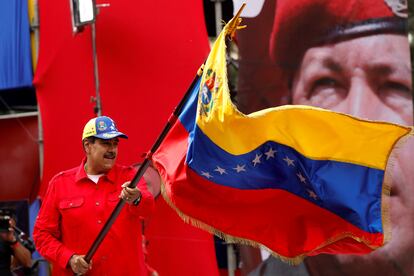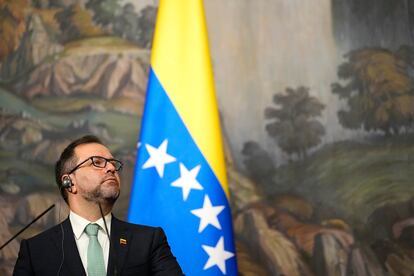Venezuela’s Maduro reverts to his most radical positions amidst wave of repression
The Venezuelan government has given the 13 members of the Office of the U.N. High Commissioner for Human Rights 72 hours to leave the country

It appears that Chavismo has changed course. Following the progress made as a result of the Barbados agreements with the opposition, the recovery of some diplomatic dialogue achieved in Venezuela in recent months — including the accreditations of new ambassadors previously downgraded and direct talks with the United States after years of hostilities —, and the prospect of resolving the lingering institutional crisis in the South American country through elections seem to have been forgotten in light of the latest escalation of repression by Nicolás Maduro’s government.
In the last three months there have been more arrests of opposition members; the candidacy of María Corina Machado, the main leader to challenge the leader of the United Socialist Party of Venezuela, has been blocked, and Rocío San Miguel, a prominent human rights defender dedicated to the monitoring of the national Armed Forces, has been imprisoned. On the domestic level, the Chavista government has reverted to strategies previously used to marginalize its adversaries. However, the fragile platform it had managed to rebuild on an international level with which it sought to regain legitimacy, after years of pressure through sanctions and the severing of diplomatic relations in reaction to the authoritarian shift experienced by the country, appears to be falling apart once again.
The Chavistas have denounced a series of conspiracies aimed at assassinating Maduro and have used them as a justification to pull out of the Barbados agreements. These deals had previously been called into question by the Supreme Court of Justice’s steps to annul the primaries and prevent Machado’s participation. This has resulted in the easing of the sanctions that had been agreed directly with Washington, which could end in two months. All of this after achieving a marginal improvement in oil production, the opening of the sector to foreign companies, and the return of the businessman Alex Saab, a financial operator linked to the Venezuelan government who became a key player during times of heightened sanctions.
This week, as tensions mounted in the ecosystem of human rights organizations over the detention of lawyer Rocio San Miguel and the breaches of due process in her case, whose defenders include forced disappearance, the government resolved to expel the representatives of the United Nations High Commissioner for Human Rights (UNHCR). A statement on the organization’s X account expressing its deep concern over San Miguel’s detention has prompted the measure announced by Venezuelan minister of foreign affairs, Yván Gil.

The reaction of rejection in the region has accelerated, with Argentina, Costa Rica, Ecuador, Paraguay and Uruguay already raising the first red flags. A diplomatic standoff with Venezuela could be on the cards again, despite the international community’s attempts to normalize relations with the oil-producing nation.
The OHCHR office was installed in 2019 after years of intense pressure from civil society on the rights situation in Venezuela. Maduro authorized the arrival of the Geneva representatives, after years of denying the humanitarian crisis, which also had a correlation in political freedoms. As social indicators deteriorated, repression also escalated in the country. “At that time, under Michelle Bachelet, the government was more willing to comply with the protection mechanisms to say that they were guarantors of human rights, even though they had previously denied the repeated violations that had been denounced,” says Ezequiel Monsalve, of the NGO Defiende Venezuela (Defend Venezuela).
In spite of their extremely limited work, civil society organizations believe that the departure of the U.N. High Commissioner’s representatives within 72 hours will have consequences for the protection of rights in the country, the access of journalists to the country that was opened in recent years, and the technical assistance provided by the authorities. “If their presence here put us at risk, now it is even more so,” warns Monsalve. The activist points out that the representatives had considerable difficulty visiting the prisons where some 200 political prisoners are currently being held in Venezuela. Nevertheless, continued reports of extrajudicial executions in poor neighborhoods perpetrated by the FAES (the special forces of the Bolivarian National Police) ultimately led to the dismantling of this police force — although its operations were transferred to other agencies — and to a decrease in the deadliness of these police raids.
Some analysts warn that Venezuela is headed towards a process similar to that experienced in the Nicaragua of Daniel Ortega and Rosario Murillo in recent years. In addition to the developments of the last few weeks, there have been signs such as the intervention of international organizations, as was the case with the Venezuelan Red Cross, and the promotion of legislative initiatives seeking to criminalize NGOs, which are currently being discussed by the National Assembly. Last year, Chavismo had seemed determined to hold a moderately competitive election where it could still control the outcome and retain power. Maduro’s toughening of his stance towards his adversaries is especially noticeable after the success of the opposition primary elections, in October 2023, and the overwhelming victory secured by María Corina Machado, the most anti-Chavista candidate of all, now elected leader, who is currently four times ahead of Nicolás Maduro in voting intentions, according to the polls.
Sign up for our weekly newsletter to get more English-language news coverage from EL PAÍS USA Edition
Tu suscripción se está usando en otro dispositivo
¿Quieres añadir otro usuario a tu suscripción?
Si continúas leyendo en este dispositivo, no se podrá leer en el otro.
FlechaTu suscripción se está usando en otro dispositivo y solo puedes acceder a EL PAÍS desde un dispositivo a la vez.
Si quieres compartir tu cuenta, cambia tu suscripción a la modalidad Premium, así podrás añadir otro usuario. Cada uno accederá con su propia cuenta de email, lo que os permitirá personalizar vuestra experiencia en EL PAÍS.
¿Tienes una suscripción de empresa? Accede aquí para contratar más cuentas.
En el caso de no saber quién está usando tu cuenta, te recomendamos cambiar tu contraseña aquí.
Si decides continuar compartiendo tu cuenta, este mensaje se mostrará en tu dispositivo y en el de la otra persona que está usando tu cuenta de forma indefinida, afectando a tu experiencia de lectura. Puedes consultar aquí los términos y condiciones de la suscripción digital.








































